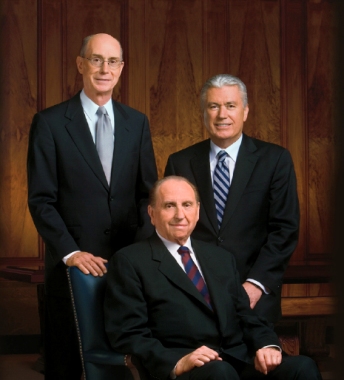It would be unfair to not start off by informing you that I am an apostate Mormon.
I rather appreciate the designation “apostate” these days. It’s a word with guts; commanding attention. I am disaffected, discomfited, discouraged, disillusioned, and disenfranchised. The prefix of all of these tells you the things I am not. Apostate tells you what I am. Take it how you will. I will take it with some cream and sugar.
I think I arrived at this state in two acts, or phases.
In the first, I started as an intensely devout Mormon guy who took it all VERY seriously. I loved my mission. I loved the Church. I loved Joseph Smith (weeping regularly during a rousing chorus of Praise to the Man). I loved Boyd K. Packer (he clearly takes it seriously, too). I loved the temple (especially the veil). I loved the Book of Mormon. I loved teaching seminary and Sunday school. I was one of those people that watch all 10 hours of conference.
I loved contemplating faith, sacrifice, and consecration.
I believed devoutly that all truth can be circumscribed into one great whole.
I completely embraced John Taylor’s electrifying declaration, “The Kingdom of God, or NOTHING!”
Some of you can see where this is going.
I studied the safe stuff: the standard works (especially, according to plan, the Book of Mormon) and general conference mostly.
I also studied stuff that I considered safe having nothing to do with Mormonism: behavioral economics, sociology, behavioral neuroscience, some philosophy, psychology.
Other factors in the mix:
I never embraced “Mormon Culture”. Ever. I thought the doctrine of Christ and the culture of green jello and hair bows on grown women could, and should, be separated. I went to BYU for one year and intensely disliked the culture. I love counterculture literature and music and thought. I put a lot of effort into trying to demonstrate that devout Mormons can fully embrace the Gospel and the rich culture of humanity simultaneously.
I mostly believe that any social skills I have didn’t come naturally. I’ll oversimplify it by saying that autism seems to run in my family and when my son was diagnosed with it, in the process of learning about him, I kept on catching glimpses of myself. My perception is that most people seem to know the “rules” of society without having to figure them out explicitly; they just cotton on. This is not my gift. But I made an intense effort to explicitly teach myself how to get along (which effort has largely paid off).
I am by nature, highly literalistic. I can’t seem to help but believe that there is an objectively correct answer to everything. This answer is supplied by functionality. Between the quality described in Zen and the Art of Motorcycle Maintenance and Dr. Phil’s classic, “how’s that working out for you?” I am very comfortable.
I prize introspection, analysis, and logic. I want things to make sense.
Ok…
I think of Act I as the slow process of ingesting the complexity of the world, bit by bit, and consciously creating (and filling) a “shelf” with troublesome details. Noah’s Ark. Joseph’s ego. Brigham’s… Brigham.
One can do that for many years without noticing how many items are on the shelf. The point of the shelf is not to examine, but to store.
Somewhere around four years ago, I became more acutely aware of the troubling nature of some of the knick knacks I was shelving. I was becoming aware of irreconcilable doctrines. I realized how much we contextualize everything, and so, the doctrine we apply is dependent on the situation, rather than the other way around.
At some point, I allowed myself to ask the question, “What if it isn’t true?”
 Willing to look at the answer, I slowly discovered that the world makes so much more sense if the Mormon Church is not God’s ONE TRUE ORGANIZATION on the Earth.
Willing to look at the answer, I slowly discovered that the world makes so much more sense if the Mormon Church is not God’s ONE TRUE ORGANIZATION on the Earth. I began to peel back the doctrinal layers to try to understand them better. I ran into all kinds of logical problems, circular reasoning, non sequiturs.
One thing I could clearly see (and to be perfectly honest, I had seen this from an early age, but shelved it); the whole system was designed to support itself.
After about a year of this, I confided to my wife that I wasn’t sure if I believed the Church was true.
She thought it would get better. I thought it would, too. I thought God would come to my rescue.
Another year or so later, I went in for a temple recommend interview and couldn’t get past the first question. The alarmed, sincere, well-intentioned counselor in the Bishopric referred me to the Bishop.
He referred me to scriptures and conference talks I had already read.
I had increasing anxiety at Church. I learned what cognitive dissonance was and had no trouble identifying it.
My poor, faithful wife watched as I spiraled further and further down the rabbit hole away from our safe, LDS, life.
I went from contemplating, to suspecting, to believing, to knowing that the Church could not be true in the way that it presents itself.
[Act I curtain]


.jpg/220px-Day_18_-_Still_Eating_The_Green_Jello_(gifrancis).jpg)
Very well written! This is so similar to my own story. I took everything very literally too and when things fell apart they really shattered.
ReplyDelete"I thought God would come to my rescue."
This line made me tear up a little bit. I really felt like that too. (For heaven's sake I'm agnostic and still kinda hope for/look for this from time to time.)
I look forward to your next post!
Nicely told! Your candor speaks volumes. Thanks for sharing this.
ReplyDelete